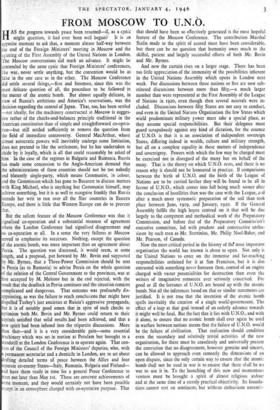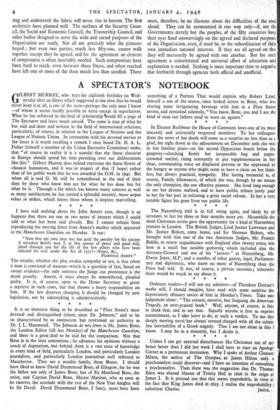FROM MOSCOW TO U.N.O.
LTAS the progress towards peace been- resumed—if, as a cynic n might question, it had ever been well begun? It is an apposite moment to ask that, a moment almost half-way between the end of the Foreign Ministers' meeting in Moscow and the (*ening of the First Assembly of the United Nations in London. The Moscow conversations did mark an advance. It might be contended by the same cynic that Foreign Ministers' conferences, like war, never settle anything, but the contention would be as false in the one case as' in the other. The Moscow Conference did settle several things,—first and foremost, since this was the most delicate question of all, the procedure to be followed in the matter of she atomic bomb. But almost equally delicate, in view of Russia's ambitions and Atherica's reservations, was the decision regarding the control of japan. That, too, has been settled —not ideally, for she machinery constructed at Moscow is sugges- tive rather of the checks-and-balances principle traditional in the American constitution than of simple and straightforward co-opera- Eon—but still settled sufficiently to remove the question from the field of immediate controversy. General MacArthur, whose almost autocratic powers, will inevitably undergo some limitation, does not pretend to like the 'settlement, but he has undertaken to abide by it loyally, which is all that could reasonably be asked of him In the case of the regimes in Bulgaria and Rumania, Russia has made some concession to the Anglo-American demand that the administrations of these countries should not be too nakedly and blatantly single-party, which means Communist, in colour, and the Commission which has gone to Bucarest to discuss matters with King Michael, who is anything but Communist himself, may achieve something, but it is as well to recognise frankly that Russia intends her writ to run over all the Slav countries in Eastern Europe,- and there is little that Western Europe can do to prevent that. - But the salient feature of the Moscow Conference was that it signalised co-operation and a substantial measure of agreement where the London Conference had signalised disagreement anfl o co-operation at all. In a sense the very failures at Moscow served to emphasise its sticcesses. Nothing, except the question of the atomic bomb, was more important than an agreement about Persia. The question was discussed, it would seem, at some length, and a proposal, put forward by Mr. Bevin and supported by Mr. Byrnes, that a Three-Power CoMmission should be sent to Persia (as to Rumania) to advise Persia on the whole question f the relation of the Central Government to the provinces, was at rst accepted by M. Molotov but in the end rejected, with the result that the deadlock in Persia continues and the situation remains complicated and dangerous. That outcome was profoundly dis- ppointing, as was the failure to reach conclusions that might have spelled Turkey's just anxieties at Ru'ssia's aggressive propaganda, ut it is of notably good omen that in spite of such checks to ptimism both Mr. Bevin and Mr. Byrnes could return to their apitals satisfied that solid results bad been achieved, and that a w spirit had been infused into the tripartite discussions. More an that—and it is a very considerable gain—some essential achinery which was set in- motion at Potsdam but brought to a tandstill at the London Conference is to operate again. That con- ists of the Council of the Foreign Ministers' deputies, who, with permanent secretariat and a domicile in London, are to set about rafting detailed terms of peace between the Allies and four parate ex-enemy States—Italy, Rumania, Bulgaria and Finland- nd have them ready in time for a general Peace Conference to eet not later than May 1st. These are concrete achievements of me moment, and they would certainly not have been possible xcept in an atmosphere charged with co-operative purpose. That that should have been so effectively generated is the. most hopeful feature of the Moscow Conference. The contribution Marshal Stalin made to the spirit of accord must have been considerable, but there can be no question that humanity owes much to the skilful, patient and largely successful efforts of both Mr. Bevin and Mr. Byrnes.
And now the curtain rises on a larger stage. There has been too little appreciation of the immensity of the possibilities inherent in the United Nations Assembly which opens in London next week. For discussions between three nations or five are now sub- stituted discussions between more than fifty,—a much larger number than were represented at the First Assembly of the League of Nations in 1920, even though then several neutrals were in- cluded. Discussions between fifty States are not easy to conduct, and even in the United Nations Organisation the few States which wield predominant military power must take a special place, as they assume special responsibilities. But their delegates must guard scrupulously against any kind of dictation, for the essence of U.N.O. is that it is an association of independent sovereign States, differing indeed in wealth, culture and military strength, but all on a complete equality in these matters of independence and sovereignty. Powers with which the few may be charged must be exercised not in disregard of the many but on behalf of the many. That is the theory on which U.N.O. rests, and there is no reason why it should not be honoured in practice. If comparisons between the birth of U.N.O. and the birth of the League of Nations are to be carried farther they will be found to be all in favour of U.N.O., which comes into full being much sooner after the conclusion of hostilities than was the case with the League, and after a much more systematic preparation of the soil than took place between June, 1919, and January, 1920. If the General Assembly fulfils the high hopes centred on it that will be due largely to the competent and methodical work of the Preparatory Commission, and before that of the Preparatory Commission's executive committee, led with prudent and constructive enthu- siasm by such men as Mr. Stettinius, Mr. Philip Noel-Baker, and Mr. Pearson, of Canada Now the most critical period in the history of the most important , organisation 'the world has known is about to open. Not only is, the United Nations to enter on the immense and far-reaching responsibilities ordained for it at San Francisco, but it is also entrusted with something never foreseen then, control of an engine charged with vaster potentialities for destruction than even the writers of imaginative romances ever seriously conceived. For good or ill the fortunes of U.N.O. are bound up with the atomic bomb. Not all the inferences based on that or similar statements are justified. It is not true that the invention of the atomic bonib spells inevitably the creation of a single world-government. The effect of a leap at that goal instead of an orderly advance towards it might well be fatal. But the fact that it lies with U.N.O., and with it alone, to ensure that no atomic bomb shall ever again be used in warfare between nations means that the failure of U.N.O. would be the failure of civilisation. That realisation should condition even the secondary and relatively trivial activities of the new organisation, for there must be ceaselessly and universally present the conviction that no disagreement, however genuine and sincere, can be allowed to approach even remotely the dimensions of an open dispute, since the only certain way to ensure that the atomic bomb shall not be used in war is to ensure that there shall be no war to use it in. To the launching of this new and momentous venture must be brought a spirit of almost religious ardour and at the same time of a sternly practical objectivity. Its founda- tions cannot rest on sentiment, but without enthusiasm unremit- Ling and undeterred the fabric will never rise to heaven. The first architects have planned well. The outlines of the Security Coun- cil, the Social and Economic Council, the Trusteeship Council, and other bodies designed to serve the wide and varied purposes of the Organisation are ready. Not all are precisely what the pioneers hoped ; but even two parties, much less fifty-one, cannot walk together except they be agreed, and for the agreement an element of compromise is often inevitably needed. Such compromises have been hard to reach, even between three Sstes, and when reached have left one or more of the three much less than satisfied. There must, therefore, be no illusions about the difficulties of the road ahead. They can be surmounted in one way only—if, not the Governments merely but the peoples, of the fifty countries keep their eyes fixed unswervingly on the agreed and declared purposes of the Organisation, even, if need be, to the subordination of their own immediate national interests. If they are all agreed on that they will necessarily be agreed with one another. But for such agreement a concentrated and universal effort of education and explanation is needed. Nothing is more important than to organise that forthwith through agencies both official and unofficial.
































 Previous page
Previous page